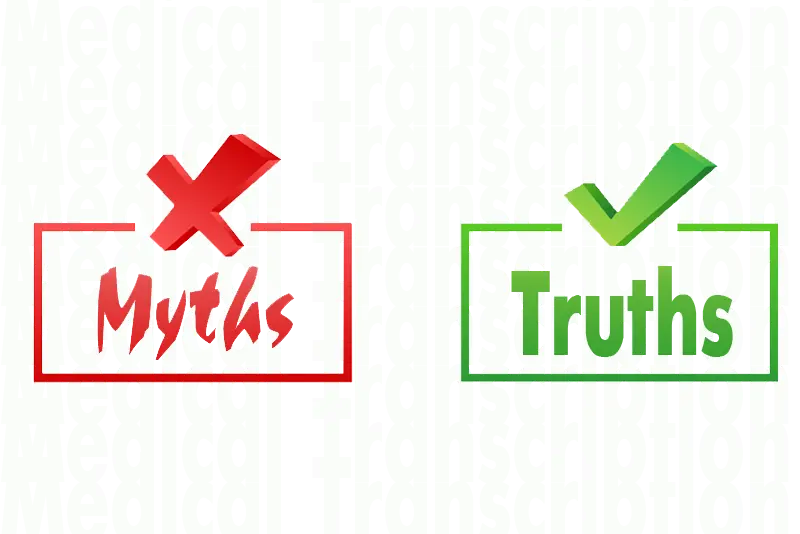According to Transparency Market Research, the global medical transcription services market is expected to cross the value of US$96.7 Bn by the end of 2028. Despite the increasing demand for these services, there are many myths about medical transcription and medical transcription outsourcing. With the valuable support that medical transcriptionists provide in helping healthcare providers maintain high quality EHR documentation, this blog seeks to dispel common myths about medical transcription services:
Common Myths about Medical Transcription
- 1. Myth: Medical transcription is like data entry
Reality: It’s true that medical transcriptionists do key in a doctor’s spoken words into the computer. Like data entry workers, they need excellent typing skills and have captured information without mistakes. But the skills needed for medical transcription go far beyond that. To ensure medical documentation accuracy, medical transcriptionists also need keen listening skills, comprehension skills, vocabulary, and plain common sense. While typing is a significant part of the job, medical transcriptionists also need to understand medical terminology, context, and nuances to accurately interpret and edit transcriptions. They should be well informed about the specialty they’re handling as well as have an independent mindset and the ability to work under tight deadlines.
- Myth: Medical transcription needs little or no training
Reality: Medical transcriptionists undergo specific and extensive training. They are trained in medical terminology and jargon, in the formatting of the different report types, HIPAA compliance and much more – everything that’s necessary to deliver accurate, timely and secure medical documentation that meets industry standards.
- Myth: AI will completely replace human transcriptionists
Reality: With the rise of Artificial intelligence (AI) and voice recognition technology, a common question arises: Is medical transcription still relevant in today’s healthcare landscape?AI and machine learning (ML) are revolutionizing the clinical documentation process by training on vast datasets to convert spoken language into written text without the need for manual typing. Some argue that automatic speech recognition (ASR) and AI voice to text technology may render human transcriptionists obsolete. While AI undeniably offers impressive transcription turnaround time, its value lessens significantly if the results are inaccurate.
- Myth: Transcriptionists don’t need ongoing training
Reality: The medical field is constantly evolving, and transcriptionists must stay updated on new terms, technologies, and regulations, often requiring continuous education and training.
- Myth: Outsourcing puts the confidentiality of patient information at risk
Reality: Outsourcing transcription often raises concerns about the security of patient files. Many believe that transferring sensitive information to external vendors increases the risk of data breaches and unauthorized access. However, this perspective overlooks the fact that established outsourcing companies have the necessary measures in place to comply with stringent regulations, such as the Health Insurance Portability and Accountability Act (HIPAA). They invest in advanced security technologies, including encryption, secure access controls, and regular audits to safeguard patient data. Healthcare providers can mitigate risks related to security by choosing a HIPAA compliant medical transcription company.
- Myth: Transcription outsourcing in healthcare is only about cost-saving
Reality: While cost is an important consideration, healthcare providers also evaluate factors such as data security, compliance with HIPAA regulations, and the outsourcing partner’s experience in managing complex medical specialties.
- Myth: Transcribed documents are always accurate
Reality: Transcription can be prone to errors, especially with poor audio quality or multiple speakers Even with outsourced transcription, rigorous quality checks are essential to identify and correct errors, ensuring patient safety.
Now, let’s consider the accuracy of human vs AI medical transcription. AI-generated transcripts can contain errors, particularly in situations with multiple speakers, unclear recordings, or specialized medical terminology. Despite the technological advancements, AI still has significant limitations. In this scenario, human transcriptionists remain essential, as they refine and correct AI-generated documents to ensure accuracy. Human transcriptionists are essential for ensuring accuracy, especially in complex cases or when dealing with unclear audio. Ultimately, the expertise of human transcriptionists is vital for producing reliable healthcare documentation.
Partner with an Expert
The role of transcriptionists in healthcare is crucial, as they ensure accurate and timely documentation of patient encounters, supporting clinical decision-making and maintaining compliance with medical record standards. Professional medical transcription not only improves the use of the new technology but also offers several benefits for the physician: more time for patient care, reduced data entry costs, increased productivity, and compliant documentation. Outsourcing medical transcription to a reliable provider can help physicians ensure high quality clinical documentation that supports patient care and complies with industry regulations.



